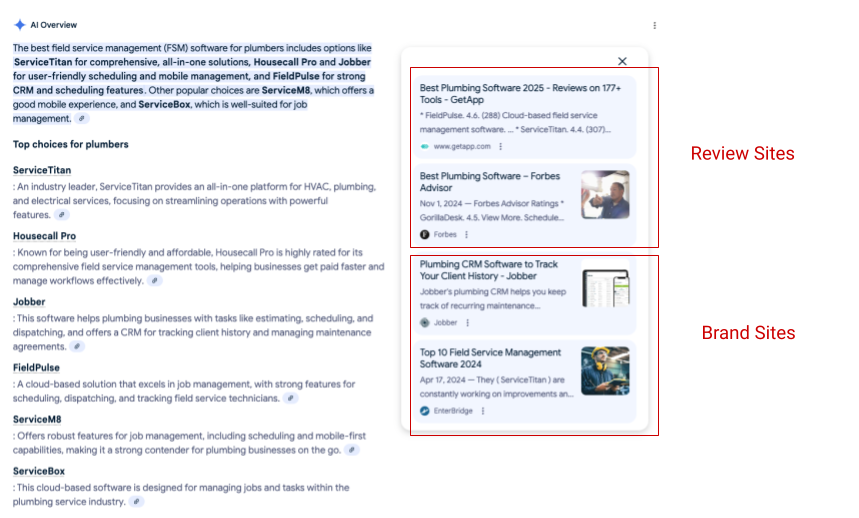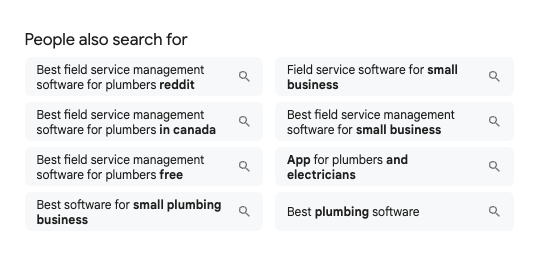I Pretended to Be a Plumber to Understand Google's AI Search. Here's What B2B Marketers Need to Know.
As marketers, it's easy to get swept up in the excitement of new tools and features that promise a competitive edge. But how often do we step into our customers' shoes to understand their actual experience when researching products?
Our customers are often busy business owners with limited time and even less subject-matter expertise in the software they're buying. They're experts in their trade, not in dissecting SaaS platforms. This is precisely why peer recommendations are gold, especially when it comes to running their back office.
So, I conducted some... let's call it highly empirical research. The focus group? Me. I decided to explore the field services category. Think plumbers, electricians, landscapers, and contractors. I’ve targeted these professionals before, and I know that while they'll use technology to be more efficient, adopting it is often the last thing on their to-do list after a long day on the job.
Sidenote: Google Will Dominate AI Search
I’m operating under the firm belief that Google will remain the key player in how people find information, including AI-generated answers. While ChatGPT gets a lot of buzz, Google handles an astronomically higher volume of queries. Inertia is a powerful force. If Google can successfully use AI Overviews to simplify the search experience, it is poised to remain the dominant force for information discovery. I’m not saying LLM search won’t be a thing, I just think Google will be bigger.
The Persona: Stan the Plumber with a Stable Operation
For this experiment, I became "Stan," a plumber looking for software. I have a team of eight people, and I'm realizing it's time to add more structure to my billing and project management. A peer mentioned that "field service software" could be the answer.
The Initial Search: AI Overviews Simplify Everything
My search query was "best field management software for plumbers". You could argue that Stan might not use those exact words, but we'll park that thought for a moment, as we know this is a competitive category.
My first impression? Google is dedicating prime real estate to AI Overviews. This space, typically reserved for sponsored content, is now front and center. Sponsored results are still present, but they've been bumped to a secondary spot.
What really struck me was the prominence of the ‘Discussions and forums’ feature. Added in late 2022, this SERP feature has been gaining traction. A 2024 study showed it was present in 77% of searches, with Reddit appearing in a staggering 97.5% of those instances. (Yes, there are concerns about spam, but we’ll set that aside for now).
Key Takeaway: If you aren't actively planning how to appear in Google AI Overviews, you are already falling behind. And yes, that means you need a Reddit strategy.
Diving into the Citations: A Mix of Review Sites and Branded Content
When I dug into the sources Google used for its AI Overview, two clear trends emerged:
App Review Sites are Heavily Favored: Five of the six results cited GetApp, a popular software review platform. As expert Lily Ray has highlighted, many of the domains most heavily cited by AI engines are pay-to-play directories or affiliate listicles. While Google has historically frowned upon this in organic search, it seems perfectly comfortable using them for AI citations.
Branded Content Still Matters: Two of the six citations featured a company’s own content. This isn't groundbreaking news in itself, but it confirms that high-quality branded content is essential. Listicles and comparison articles have long been a staple of B2B SaaS marketing, and this shows you must continue creating and frequently updating them.
Your New Top Priority: Winning on Reddit
It's established: AI models love Reddit. A study by Profound revealed that Reddit accounts for 2.2% of Google AI Overview citations, making it the #1 cited source. Combine that with its dominance in the ‘Discussions & Communities’ SERP feature, and it becomes clear: you cannot afford to be invisible on Reddit.
I explored one of the discussions about Field Service Management software and found a lone, crafty account executive hunting for leads. All credit to them for their hustle, but companies need a more systemic approach. It's not about dropping sales reps into book demos. It's about having experts who add value, help people understand the landscape, and guide them toward the best solution for their specific needs.
And don't be deterred by old threads—Google doesn't care! Discussions from over five years ago are still surfacing. Get in there and start helping people now.
Key Takeaway: You need a robust strategy for discussion platforms like Reddit and Quora. Your customers are already there, researching your category.
"People Also Ask": Your Roadmap to Customer Intent
This classic Google feature is a treasure trove of insights. While not a new AI feature, "People Also Ask" (PAA) shows how AI systems "fan out" to understand the various related questions a user might have.
Think of the progression from a broad query like "best field service software" to more specific questions like:
"best free field service app for plumbers"
"best invoicing app for plumbers"
These questions map directly to a customer's journey through the research and discovery funnel. Steve Toth’s seonotebook.com newsletter offers fantastic ways to mine PAA data, including using the free browser extension from Detailed.
Key Takeaway: Use PAA to understand the full spectrum of customer questions and build content that addresses every stage of their journey.
The Down-Funnel Comparison: Where Video and Competitors Shine
Let's return to Stan the Plumber. He's narrowed his options and now runs a more specific search: “I’m a Plumber with 8 employees looking at Jobber and HouseCallPro. Which is better for me?”.
The AI Overview provided a solid summary comparing the two tools. What surprised me was the heavy citation of YouTube videos. This suggests that as users move further down the funnel and their queries become more specific, formats like video—especially from third parties, influencers, and unbiased reviewers—are prioritized. While this is a single, anecdotal search, the takeaway is clear.
Even more interesting was how a competitor's blog post was used as a source. Fieldex, another FSM software, was cited eight times in the AI Overview to explain why someone might choose Jobber or HouseCallPro.
Key Takeaway: There is no silver bullet for getting cited in AI Overviews. Success requires a multi-pronged approach: build grassroots community engagement, collaborate with influencers, and create your own comprehensive comparison content.
A Final Thought: Given that branded content from competitors is being cited, why aren't more "frenemies" working together? A coordinated effort to mention each other's strengths in listicles could be a powerful way to dominate AI-generated results for an entire category.
Good luck building your strategies for 2026 and beyond. Building a modern AEO and GEO strategy can feel daunting, but the opportunities are immense.
(P.S. I've compiled more tactical notes on how to budget for AEO and GEO in 2026. You can check them out here.)





